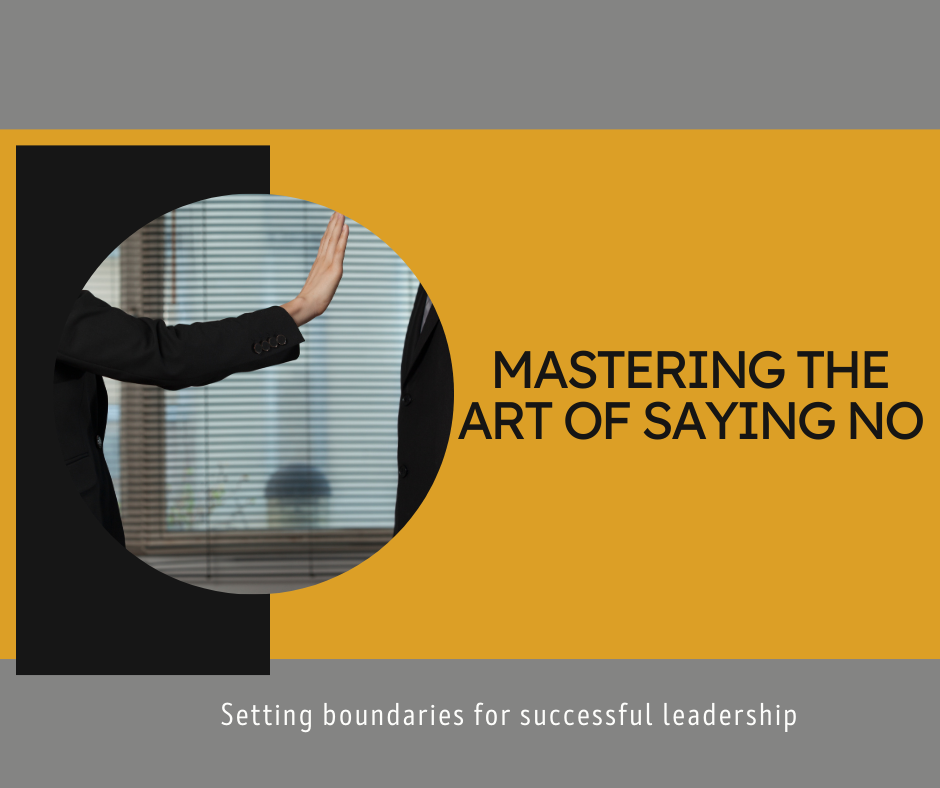As a business leader with a hectic schedule, your time is valuable and constantly sought after. Balancing client demands, team projects, and industry obligations can be overwhelming. Failing to establish boundaries and turning down opportunities can result in burnout, reduced efficiency, and a loss of focus on key objectives. Learning to say no is crucial for executives and entrepreneurs looking to regain control of their time and resources. This article will delve into the significance of setting limits, offer tips on politely declining requests, and highlight the advantages of saying no.
The Importance of Setting Boundaries
In today’s always-on, hyper-connected business landscape, it’s easy to feel you need to be available 24/7. The fear of missing out or letting someone down can make turning down opportunities or requests challenging. However, failing to set clear boundaries can severely affect your well-being and your ability to lead effectively.
When you say yes to everything, you spread yourself too thin, leaving little time and energy for the essential tasks and strategic priorities. This can lead to increased stress, diminished focus, and a sense of being overwhelmed and unfulfilled. Ultimately, your productivity, decision-making, and leadership capabilities suffer. According to a survey by the American Psychological Association, 75% of adults reported experiencing moderate to high levels of stress in the past month, with work being a significant contributor. By learning to say no, you can help mitigate the negative impacts of chronic stress and burnout.
Techniques for Politely Declining Requests
Saying no doesn’t have to be aggressive or damaging to your relationships. The right approach can strengthen your professional standing and demonstrate your leadership abilities. Here are some techniques for politely and professionally declining requests:
- Respond Promptly: Don’t leave requests hanging. Acknowledge the request and promptly respond, even if it’s a polite decline. This shows respect for the other person’s time and prevents the situation from dragging on.
- State Your Decision: When declining a request, respond directly and confidently. You do not need to provide a lengthy explanation. A simple statement like “I won’t be able to take this on, but thank you for thinking of me” is sufficient.
- Suggest Alternatives: If appropriate, offer an alternative solution or suggest someone else who may be better suited to the task. This demonstrates that you’re trying to be helpful, even if you can’t directly assist.
- Express Gratitude: Thank the person for the opportunity and let them know you appreciate being considered. This helps maintain a positive relationship, even if you decline the request.
The Benefits of Saying No
Mastering the art of saying no may initially feel uncomfortable, but the benefits far outweigh the short-term discomfort. Here are some of the ways that learning to decline requests can positively impact your business and your life:
- Increased Productivity: You free up time and mental energy to focus on your most critical strategic objectives by saying no to low-priority tasks and commitments. This allows you to be more productive and achieve more significant results.
- Reduced Stress and Burnout: Overcommitting yourself is a surefire path to burnout. According to a study by the World Health Organization, burnout is characterized by feelings of energy depletion, increased mental distance from one’s job, and reduced professional efficacy. Saying no helps you maintain a healthier work-life balance, reduce stress, and avoid the negative impacts of chronic overwhelm.
- Improved Decision-Making: When you’re not stretched thin, you can make better-informed, more thoughtful decisions. This leads to more effective leadership and better outcomes for your business.
By mastering the art of saying no, you can control your time and energy and align your commitments with your highest priorities. This, in turn, can boost your productivity, reduce stress, and make you a more focused, impactful leader.
You have to decide what your highest priorities are and have the courage pleasantly, smilingly, and non-apologetically – to say no to other things. And the way to do that is by having a bigger yes burning inside. Stephen Covey


0 Comments